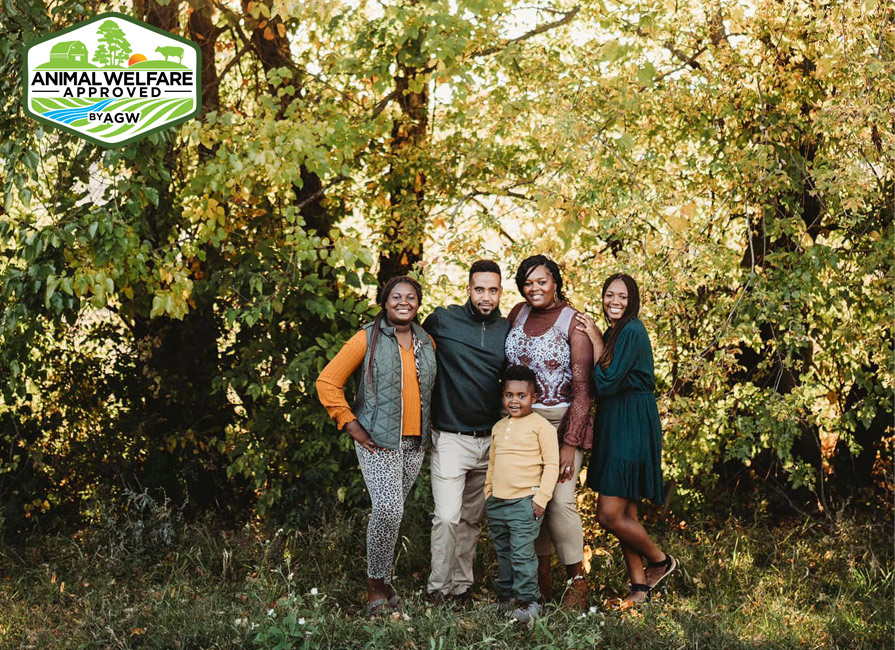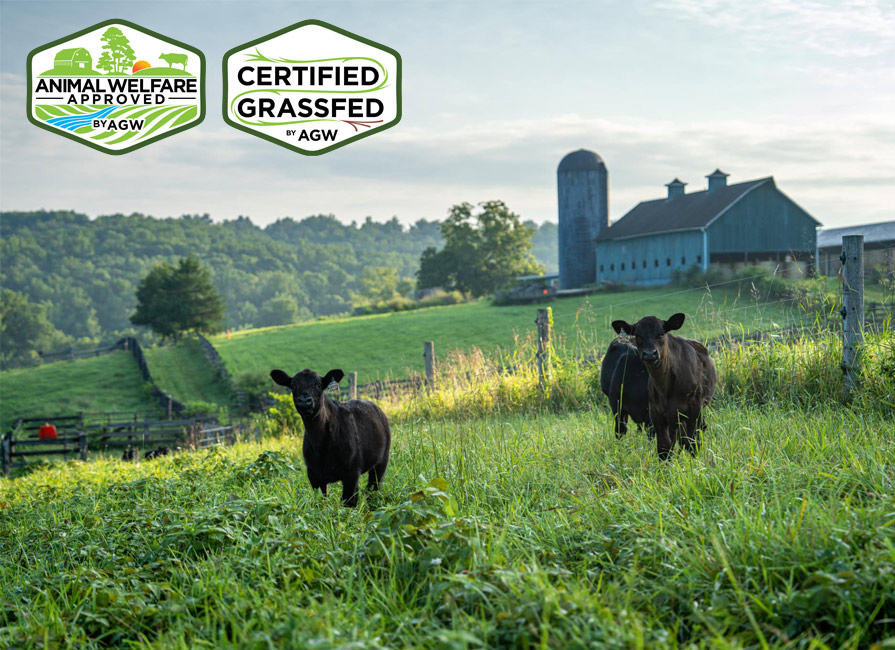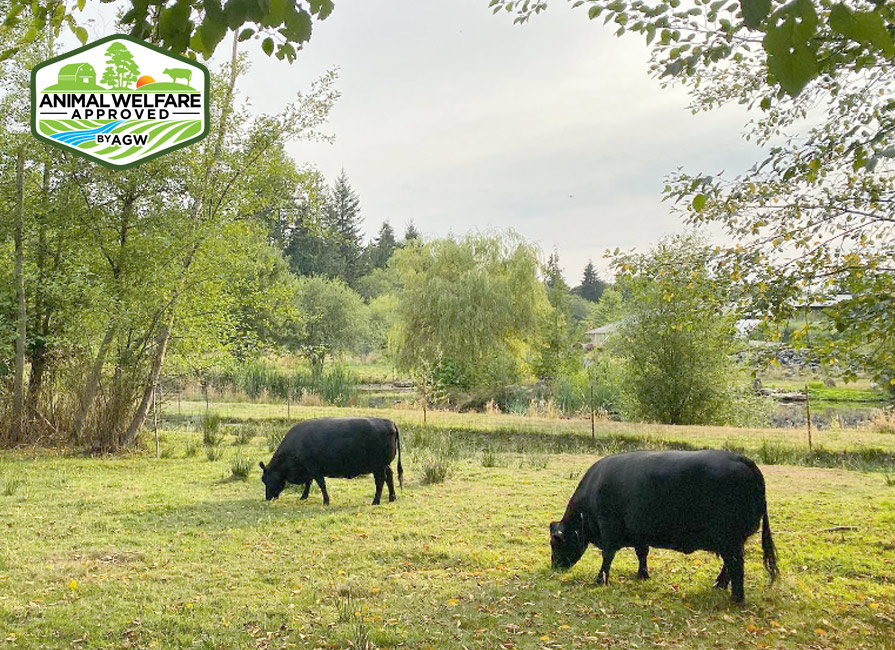Vanessa Frias and her family raise Certified Animal Welfare Approved by A Greener World (AGW)…
Three Farms In Hawaii Are First to Earn AWA Seal
Animal Welfare Approved is pleased to announce that Eden Earthworks in Mountain View, Hawaii Lowline Cattle Company in Honoka’a, and Kauai Kunana Dairy on Kauai’s North Shore, have recently been awarded the Animal Welfare Approved seal for high-welfare animal husbandry.
According to Animal Welfare Approved Program Director Andrew Gunther, “Hawaiians, like their mainland counterparts, are interested in purchasing locally produced farm products from sustainable, humane farms. Being able to find these products is especially important in a state where an estimated 85 percent of the food is imported. We are excited to be a part of the effort to grow Hawaii’s farming community and to make sure Hawaiians can purchase products that align with their values.” Hawaii Governor Linda Lingle announced an initiative to increase Hawaii’s food self-sufficiency in her 2009 State of the Union address.
Farming in Hawaii presents some challenges that are not found on the mainland, especially for cattle production. Cattle that are born, raised and slaughtered in Hawaii are still very rare. According to Gunther, one of the challenges facing farmers in Hawaii is the lack of island-based slaughter facilities. “Cattle raised in Hawaii are routinely transported to the mainland for slaughter, which is extremely stressful for the animals and very unsound environmentally,” he said. “When our auditors went to visit, the lack of slaughterhouses was a concern, but we were pleased to see there are still some small slaughterhouses available and they were very willing to work with AWA.”
Gunther is impressed with the energy behind Hawaii’s commitment to building a diverse local agricultural system. “While there, we met with local extension agents and were quite impressed with their dedication to providing increased opportunities for Hawaii’s farmers. We are very much encouraged and the future is bright for meat, dairy and eggs from local, humane family farms in Hawaii.”
Farm Profiles
Increased food security is one of the guiding principles behind Eden Earthworks, run by Dr. Neena Roumell. Roumell is originally from Detroit and worked with low-income mothers there, who were given vouchers through the WIC program to buy fresh produce. “In Detroit,” Roumell noted, “there were over 300 community gardens, but there were none on this side of the Big Island when I arrived here. Hawaii is just starting to build its network of food production and farmstands, and I didn’t want lower income people to be left out. I looked at food models that concentrated on boosting income and nutritional intake and Eden Earthworks was formed.”
Eden Earthworks is a family owned farm and 501(c)(3) organization that provides agricultural outreach and education to low-income families and also offers them plots in a community garden. Currently, 35 families have plots and are raising food. Eden Earthworks also keeps a flock of laying hens that Roumell feels every farm needs to be sustainable. Eden Earthworks donates the eggs to food-based local charities but as Eden Earthworks expands, she plans to train the participating families in caring for the chickens and having them all share in the fresh eggs. “Becoming Animal Welfare Approved was an important thing to do,” she notes. “I wanted to be sure the chickens were getting the quality of care they deserved and having the AWA label reinforces that. In addition, the standards will help our beginning farmers to know how to care for the chickens on their own.”
Hawaii Lowline Cattle Company is proud to be part of the resurgence in Hawaii of raising and finishing cattle locally, on pasture. The farm was started by Rick and Haleakala Sakata and Dwayne and Tammie Cypriano, both of Ahualoa, Hawaii. Dwayne Cypriano, an independent rancher who formerly worked in cow-calf operations (keeping a breeding herd of cows and weaning calves for the feedlot system), and Rick Sakata saw an opportunity to do their part to advance Hawaii’s food self-sufficiency by building a herd of Lowline Angus cattle on their ranches. “Lowlines are Angus beef cattle in a compact, smaller frame size. They originated in Australia, where the beef is known for its excellent taste, texture and tenderness characteristics,” Sakata explained. “We were looking for two things when establishing our herd: cattle that were docile and cattle that were well-suited to beef production on grass, and that more efficiently converted grass to meat than today’s larger breeds. Lowline Angus cattle have great dispositions –calm and tame. Our grandchildren spend a lot of time helping us and we don’t worry about them so much around the Lowlines. Because of their moderate size, two Lowlines can use the pasture space of one of today’s larger breeds, providing more beef per acre of grass and making the land more productive. That’s very important on an island with limited pasture space.”
The Sakatas and Cyprianos purchased their first Lowlines at the start of 2008 and brought them to Hawaii from the mainland. They had the cattle flown in instead of shipped so that the journey would be less stressful, even though it was more expensive. “We want to take great care of our cattle and go the extra mile,” Rick Sakata says. “That’s why we decided to apply to Animal Welfare Approved – it aligned nicely with our beliefs and will give our customers another reason to trust the quality and integrity of our product.” Hawaii Lowline Cattle Company’s herd of Lowlines is currently the only registered
Lowlines in the state of Hawaii and when the first calf was born in September 2008, it was cause for celebration. “Our first island born calf,” Sakata says proudly. “A true Hawaiian.”
Louisa and Bob Wooton of Kauai Kunana Dairy, which produces farmstead goat cheese, are also dedicated to their animals and the role they will play in bringing Hawaiians fresh, local, environmentally sustainable food. They have been raising goats in Hawaii since 1979 and making goat cheese for the past decade. “We are the only dairy on the island of Kauai,” Louisa Wooton says proudly. “Kauai Kunana Dairy is a true family farm. We built everything on the farm ourselves, including the house. Our eldest son Ryan and his wife Sarah are our partners.”
With a milking herd of approximately 28 goats and total herd of 40, the Wootons are pleased with the reception their goat cheese has received. “Almost all of our cheese is sold on the island of Kauai,” Wooton explains. “Even with the drop in tourism because of the economy, our business is doing great. We’ve found our community to be very committed to supporting local farmers and we’re increasing the number of restaurants that serve our cheese.”
The Wootons have high praise for their goats and chickens. According to Louisa Wooton, “Our animals are an integral part of our farm. Our goats are intelligent and friendly and besides supplying milk for great cheese, they mow the orchards and we turn their manure into fertilizer. Our chickens are in charge of the banana patch—they weed, scratch, eat the bad insects and thin the bananas. Interacting with our goats and chickens every day is one of the great joys of farming.”
For the Wootons, applying to be Animal Welfare Approved was an easy decision because it’s a true reflection of the care and respect they give their animals. “Having the Animal Welfare Approved seal is something we’re really, really proud of,” Louisa Wooton says. “Our customers are responding well to it and we put it on everything. We don’t see how any farm can survive that’s not AWA!”



